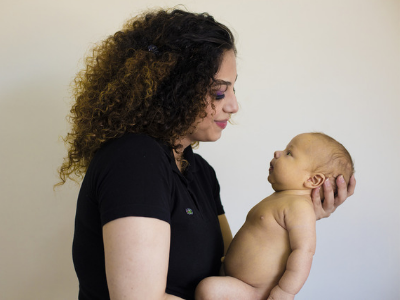 Not all mothers identify strongly with motherhood, just as not all mothers give the birth of their child much thought after the fact.
Not all mothers identify strongly with motherhood, just as not all mothers give the birth of their child much thought after the fact.
However, for a large number of women, birthing a baby is one of the most transformative moments of their life: it is when a new part of their identity is revealed, that of becoming someone’s mother.
Birth itself is a process that can be physically demanding, exhilarating, unnerving, joyous, heartbreaking, life-changing, frustrating, happy, unpredictable, empowering, and so much more! There are as many descriptions of birth as there are mothers on the planet.
Women make up to 75 percent of all training clients and, in the U.S. alone, 85 percent of all women will be pregnant at some point in their lives.
As a coach and trainer, if you work with women, it is extremely likely you will have at least a few women clients who have given birth.
Enter, the Birth Story
One aspect of being a mother that isn’t as readily discussed yet in Western society is how the act of birth itself can impact a woman.
Birth story refers to the recounting a woman does of the birth of her child. In this narrative she may describe not only the medical and physical processes, but also her feelings, her thoughts, the challenges she faced, from her own unique perspective.
Some birth stories are hilarious! Others are heart-wrenching. There is no right or wrong birth story — they each serve a multitude of purposes, out of which the most important might be helping the mother contemplate and make sense of the experience she has gone through.
Storytelling has been an essential thread in the fabric of humanity for as long as humanity has existed.
Across millennia, through stories, humans have passed on teachings, lessons and cultural identity, and fostered community, bonding, communication, and survival. This may explain why many women volunteer their birth stories as soon as they found out their friend is pregnant, or why birth stories abound each time mothers of young children unite, such as in infant playgroups.
Community, bonding, communication, survival — the very fabric of humanity at work!
Why This Is Relevant to Fitness Professionals
If you tend to compartmentalize clients’ lives and assume that other areas of their life do not directly impact the training and coaching you do with them… we’ve got news for you!
Let’s flesh out some of the ways in which her birthing experience may be impacting your client’s training experience. The following points are equally applicable to brand-new moms as well as women who had their children years or even decades ago:
Physically
- Did your client visit a pelvic floor specialist at any point after the birth?
Ideally every woman client who has been pregnant or has given birth should visit a pelvic health physiotherapist and be cleared for exercise.
- Does she have any scar tissue, pelvic floor or core issues, dysfunction, incontinence, diastasis recti, pain, or discomfort?
If existent, the factors above will come into play as you design a program for your client, and will need to be taken into consideration during training sessions.
- Is she nervous, hesitant or fearful to try certain movements in the gym?
If so, you can probably imagine this will directly impact the work you do together.
Mentally
- What does she think about herself as a result of her birth experience?
Think of a client who perceives themselves as a failure. Now think of one who holds a can-do attitude. How she thinks of herself will surely have an impact on how your training experience goes, and birth can be one reason why this self-perception is altered, either positively or negatively.
- What does she think about her body, its abilities and disabilities, its potential, its strength or lack thereof?
Similar to the point above, the experience of giving birth and how a woman internalizes the process can play a big part in how she views what her body is capable of accomplishing.
- How is she coping with her physical and mental recovery?
If there are follow up appointments, physical therapy to pursue, how is she managing the follow-up work with a newborn (or, potentially, with the grief of loss) in tow?
It is often said “At least you have a healthy baby!” in response to a woman’s difficult emotions toward how the birth played out. This is dismissive and reduces her entire person to one outcome.
Of course women want healthy babies, that goes without saying! But this doesn’t mean your client doesn’t get the right to voice and work through any feelings of anger, frustration, disrespect, sadness, or despair that may have arose as a result of her birth experience.
Emotionally
- How are her feelings of self-worth?
- Does she have feelings of success or empowerment?
- Does she have feelings of inadequacy or failure?
- Is she facing any postpartum PTSD, postpartum depression, anxiety, or depression as a result of the birth experience?
Some births are traumatic: scary life or death situations in which the woman or her baby’s life are in danger. However, a birth doesn’t have to be a medical life-threatening emergency in order to be traumatic — many factors and each woman’s unique lense will make it out to be the experience it is for each.
What Is Obstetric Violence?
Obstetric violence is a term coming to light recently, and it encompasses a number of human rights violations women can encounter during pregnancy, delivery, and postpartum. It is considered an intersection between violence against women and institutionalized violence, and it manifests in a number of ways:
- Disregard of a woman’s needs and pain
- Verbal humiliation
- Physical violence
- Denial of a treatment
- Coercion and forced medical interventions
- Invasive practices
- Dehumanizing or rude treatment
- Detention in facilities due to failure to pay
- Discrimination based on race, economic, ethnic or educational background, gender nonconformity, age, HIV status, marital status, etc.
Each of the above represent a violation of human rights, including right to freedom from discrimination, right to information, right to reproductive autonomy, etc.
It is very possible that some of your clients will have encountered instances of obstetric violence. By being informed that such a phenomenon exists you are already helping in some way.
For some women it can be very helpful and comforting to know they are understood in the pain they have endured and that others believe and grasp the gravity of the situation. You may not be able to take away the pain of how your client was treated, but by understanding this term and what it means you may help lessen her suffering.
How to Talk To Our Clients About their Birth Story
1. Prepare Yourself
The work starts with you, coach: before you even think about asking a woman about her birth experiences, check in with yourself and make sure you are ready to receive all that may come your way.
- Will you be ready to listen and hold space if the story turns for the worst?
- Are you prepared to be present in case the story describes miscarriage, stillbirth or infant loss?
- Can you remain receptive and compassionate to the potential of birth trauma playing a role in her current life?
- Are you ready for nitty-gritty details, perhaps the kind that most people would find highly personal, embarrassing, shameful or “TMI”?
- Will you be OK with women who choose not to disclose any information at all and refuse to talk about the topic with you?
- Do you have referral information at hand in case she could benefit from seeing a professional, i.e. a counselor, therapist, pelvic floor physio, or other specialist?
- Above all, are you ready to remain judgment-free for the women who share their stories?
Some of the things they will describe may conflict with your own personal values and beliefs; but this isn’t about you and what you would have done in their situation. This is about them and their story.
Your only role as a coach is to honor the information shared and find the best ways to help your client in the measures available to you.
2. Ask Open-Ended Questions
- “Tell me about what this experience was like for you?”
- “Do you notice any differences in how your body feels now vs. before?”
- “What thoughts commonly come up when you think about your birth experience?”
- “What else would you like me to know about your birth?”
What we are looking for are clues and insights. This includes physical symptoms that may impact her training, of course, but also mental state around the event and emotional processing of what happened, since all of it could play a role in how she relates to her body now.
3. Empathize, Empathize, Empathize
We cannot say this enough: when going down the path of something as deeply personal and potentially triggering as childbirth, you must first and foremost come equipped with your utmost empathy and compassion.
Do your best to tap into what your client is feeling as she describes her story. Voice back some of her key statements so she understands you are listening attentively. If her story is mired with difficulty and complicated emotions, seek to connect:
- “I’m so sorry this happened to you.”
- “I feel deeply for what you went through.”
- “I can see how hurtful this was for you.”
- “How incredibly difficult, I’m so sorry.”
Tears may flow as these narratives take over; some will be happy tears, others will not.
Don’t be afraid of being human and letting your own feelings show — often this display of shared humanity is exactly what our clients need in order to feel seen and heard.
In Conclusion
Talking with our women clients about their births can shed light into important physical, mental and emotional insights about them, which are very valuable to us as wellness professionals.
 Aside from how this knowledge can be applied in our practice for her benefit, by giving them a space where to share their birth stories, which are often intimate and deeply personal, we are also fostering profound connection and meaningful, long-lasting relationships.
Aside from how this knowledge can be applied in our practice for her benefit, by giving them a space where to share their birth stories, which are often intimate and deeply personal, we are also fostering profound connection and meaningful, long-lasting relationships.

